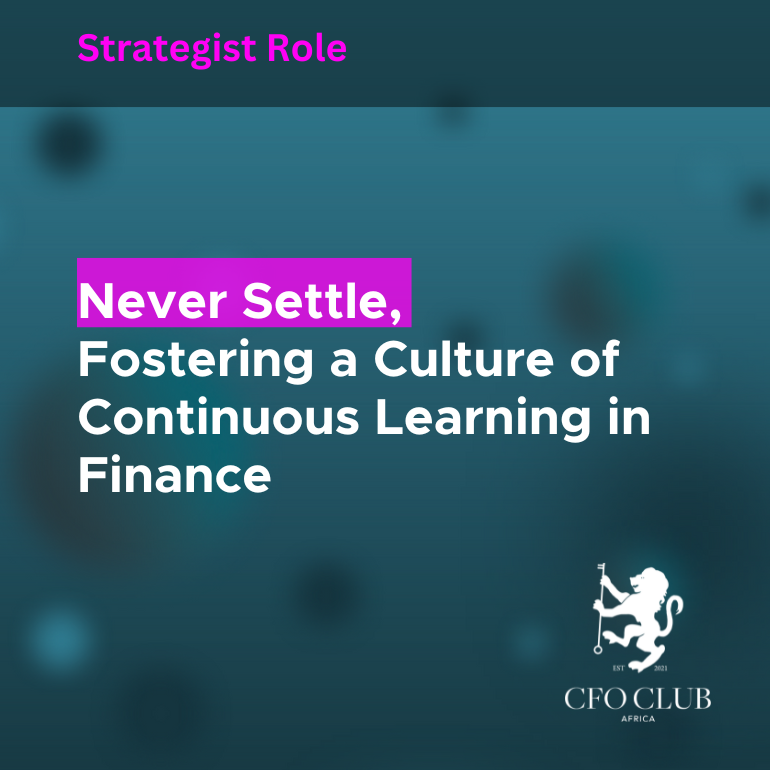Never Settle, Fostering a Culture of Continuous Learning in Finance
In the ever-evolving landscape of finance, the role of the CFO has transformed dramatically. No longer confined to balancing books, today’s CFOs are at the forefront of shaping strategy, guiding decision-making, and steering their organisations through complex challenges. To maintain a competitive edge, it’s crucial to embed a culture of continuous learning within your finance team. This approach not only equips your team to navigate today’s demands but also prepares them to innovate and lead in the future. Here are actionable strategies to help you build a learning-driven finance function that thrives on growth and adaptability.
Embrace the Learning Mindset: Lead by Example
As a CFO, your approach to learning sets the tone for your entire team. Demonstrate that learning isn’t a once-off event but a continuous process. Share your own learning experiences, whether it’s a recent course you took, an article you read, or a new financial tool you explored. When your team sees you valuing learning, they’ll be more inclined to follow suit.
Make time in your schedule for learning—whether it’s 15 minutes a day to read industry news or attending webinars. Share these learning moments in meetings to inspire your team.
Provide Access to Learning Resources
One of the biggest barriers to continuous learning is access to resources. As CFO, ensure your team has the tools they need to grow. This could include online courses, industry journals, webinars, or even subscriptions to finance-focused platforms. Invest in these resources as you would with any other critical business tool.
Curate a list of recommended resources for your team and set aside a budget for courses and training. Encourage team members to explore topics beyond their immediate roles to broaden their perspectives.
Create a Safe Environment for Learning
Learning often involves making mistakes, and it’s crucial for your team to feel safe to try, fail, and try again. Encourage open dialogue about challenges and mistakes, framing them as learning opportunities rather than failures. This openness will cultivate a culture where team members feel comfortable sharing new ideas and approaches.
Implement ‘learning sessions’ where team members can discuss what didn’t go as planned in recent projects and what they learned. This fosters a growth mindset and shows that continuous improvement is part of the process.
Encourage Peer Learning and Mentoring
Your team is full of unique skills and experiences—tap into this resource by fostering peer learning and mentoring. Create opportunities for team members to share their knowledge, whether through regular presentations, roundtable discussions, or one-on-one mentorship programs.
Introduce “Lunch and Learn” sessions where team members present topics, they’re passionate about. This can be a relaxed, informal way to encourage sharing and learning from one another.
Integrate Learning into Daily Work
Learning shouldn’t feel like a separate task; it should be integrated into everyday work. Use real projects as learning opportunities, encouraging your team to apply new skills or approaches. For instance, when implementing a new financial system, involve your team in the set-up and decision-making processes, turning the project into a hands-on learning experience.
Assign roles in projects that challenge team members to learn something new. Follow up with discussions about what went well and what could be improved to solidify the learning experience.
Recognise and Reward Learning Efforts
Recognition is a powerful motivator. Acknowledge and celebrate your team’s learning efforts, whether it’s completing a course, developing a new skill, or contributing innovative ideas. This recognition can be formal, like certificates or bonuses, or informal, such as shout-outs in meetings.
Create a “Learner of the Month” recognition program that highlights team members who go above and beyond in their learning journey. This not only rewards individual efforts but also motivates others.
Stay Updated on Industry Trends
The finance world is constantly evolving with new regulations, technologies, and practices. Keep your team informed about these changes and how they impact your business. Hosting regular update sessions can help your team stay on the cutting edge, adapting quickly to new trends and maintaining your competitive advantage.
Schedule monthly briefings where you discuss the latest trends and how they affect your organisation. Encourage team members to bring their insights, fostering a collaborative learning environment.
Measure Learning Impact
It’s essential to measure the impact of learning initiatives to ensure they are delivering value. Regularly assess whether the skills your team is developing are aligning with your business needs and strategy. Use performance reviews, feedback, and project outcomes to gauge the effectiveness of your learning culture.
Implement regular check-ins where team members reflect on what they’ve learned and how they’ve applied it. Use these insights to refine your learning approach continuously.
Conclusion
Fostering a culture of continuous learning in your finance team is more than a nice-to-have; it’s a strategic imperative. By leading by example, providing resources, creating a safe environment, encouraging peer learning, integrating learning into work, recognising efforts, staying updated, and measuring impact, you can build a dynamic team that’s always ready to tackle new challenges. As a CFO, nurturing this culture not only enhances your team’s skills but also drives your organisation’s success. Never settle—keep learning, keep growing, and keep leading with excellence.

